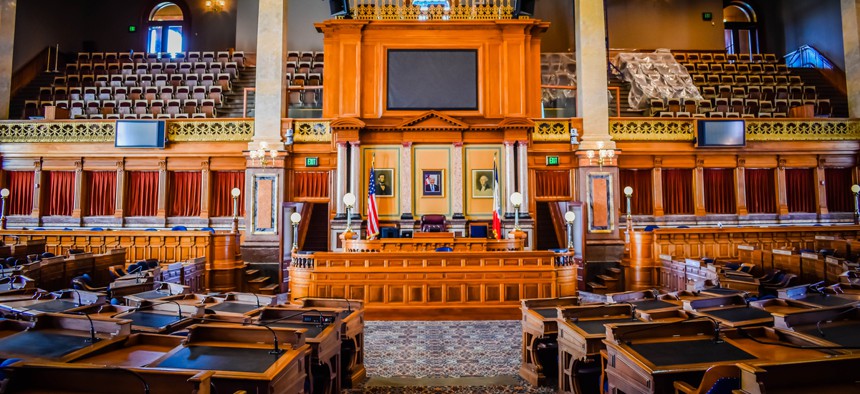State Bill Would Grant Meatpacking Plants and Health Providers Immunity from Coronavirus Lawsuits

A bill approved Friday by the Iowa House would grant meatpacking plants in Iowa immunity from most coronavirus-related lawsuits. Shutterstock/Brett Welcher

Connecting state and local government leaders
Legislation approved by the Iowa House would shield businesses and health-care facilities from most coronavirus-related lawsuits.
A bill passed by the Republican-led Iowa House last week would offer broad protections from coronavirus lawsuits for businesses and health-care providers, including meatpacking plants, hospitals and nursing homes.
As written, the bill—approved 52-44 along party lines in the state House late Friday night—would prevent Iowans from suing a business or health-care facility unless they were hospitalized or died from Covid-19. Even then, the business or care facility is protected from legal action, provided it was in “substantial compliance or was consistent with” state or federal health guidelines related to coronavirus safety.
Those protections are retroactive to any lawsuits filed on or after Jan. 1, and would extend to meatpacking plants, which have been hotspots for virus outbreaks across the country. More than 20,000 infections have been traced to 216 meat processing plants in 33 states, according to an analysis by the Midwest Center for Investigative Reporting.
Plants in Iowa have accounted for more than 3,000 of those cases, the most of any state. Despite recent cases, Tyson Foods—the state's largest processor—said last week it would resume an attendance policy that docks workers for missing shifts. A company spokeswoman told the Des Moines Register that workers with symptoms of Covid-19 will be allowed to get excused absences, as will those who test positive, while Tyson also installed barriers between worker stations and adopted other safety measures.
Supporters said the lawsuit legislation was necessary to encourage swift economic recovery throughout the state.
“(Business owners are) scared to death that they’re going to be sued when they have tried to do their best to substantially accomplish and follow the regulations and the proclamations and the changes,” said Rep. Gary Carlson, a Republican from Muscatine. “We have to provide them with some certainty that if they’re doing that, they can successfully restart their company.”
Democrats in the state House offered several amendments to address concerns about exposure in the workplace, including a proposal to extend workers’ compensation to employees who contracted Covid-19 after being required to report to work throughout the pandemic.
"They never got to go home, they never got to quarantine. They had to go to work," said Rep. Scott Ourth, a Democrat from Ackworth. As the state reopens, he said, "they're left with a choice—go back to a place that will likely have the coronavirus alive and well and circulating in that environment, or lose your job and unemployment and be left with nothing."
None of the amendments passed. Without the proposed changes, Democrats said, the bill strips protections from workers while shielding potential “bad actors.”
“The bill that you have almost rewards those bad actors and doesn’t protect those that are the good actors,” House Minority Leader Todd Prichard said during a floor debate. “Think about what you’re doing here, because your decision and your vote has lives hanging in the balance.”
The legislation, added to a medical malpractice bill that previously passed the state Senate, passed quickly last week through a House subcommittee and committee. It moves next to the Senate, where legislators will decide whether to approve the new language and send it to Gov. Kim Reynolds. Reynolds, a Republican, said at a press conference Thursday that she would “take a look at it in its final form” before deciding whether to sign it.
As of Tuesday, Iowa had 22,178 confirmed cases of coronavirus and 623 deaths.
Kate Elizabeth Queram is a staff correspondent for Route Fifty and is based in Washington, D.C.

NEXT STORY: State and Local Public Workforce Hit With Thousands More Job Losses




